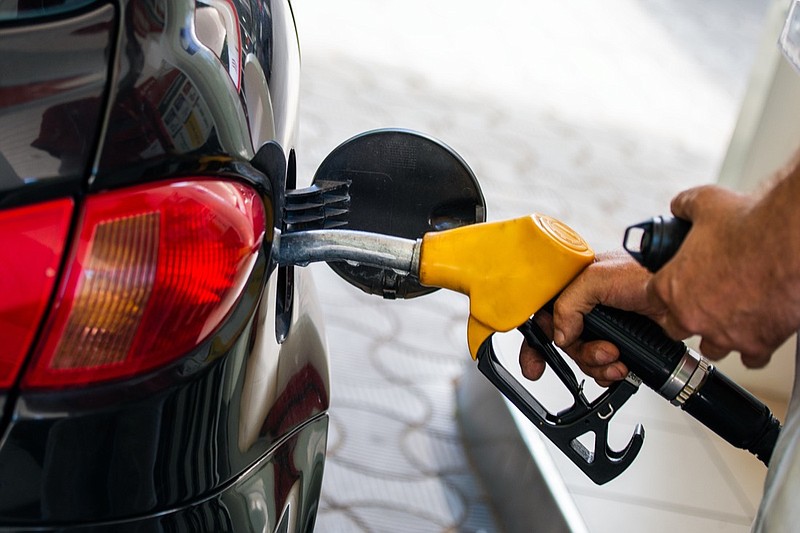MAYBE: Flat-rate mileage-based user fees make sense
By Iain Murray
It's plain that the federal gas tax is past its sell-by date. Originally introduced as a fair way for automobile drivers to pay for the upkeep of the roads they use, it has become less fair as rich people buy hybrid and electric vehicles. Instead of bailouts, the gas tax needs replacing.
A system of mileage-based user fees (MBUFs), where people pay depending on how many miles they drive, makes sense. However, some people think the fee needs to be different depending on how many emissions your vehicle puts out. That doesn't make sense, and it repeats the mistakes of the current gas tax.
The gas tax was fair because it was based on a simple principle: user pays, user benefits. Before the gas tax, all taxpayers paid for the upkeep of roads and building new ones. But this was particularly unfair to the poorest people who could not afford a car. The creation of the Highway Trust Fund in 1956 and the introduction of the gas tax to pay for it switched the burden to the people who used roads and highways. The more you used the roads, the more gas you used, the more you paid for their maintenance and the creation of new roads.
Yet in recent years the gas tax has moved more toward a "some users pay/all users benefit" model. With the introduction of hybrid-electric and all-electric vehicles, some road users have been paying far less than their fair share for the wear and tear they impose on the roads as they pay less or nothing at all in gas taxes.
This unfairness is compounded by the fact that hybrid or electric vehicle (EV) owners are likely to be well-educated, young and comparatively well-off. A study by TrueCar.com, for example, found that the average owner of a Ford Focus Electric had a household income of $199,000 a year. The people who are paying the most for road upkeep are more likely to be less well-educated, older and poorer than the hybrid/EV owners. The gas tax has become, in the language of taxation, regressive.
Switching to MBUFs would help alleviate this disparity. Hybrid and EV owners would once again pay into the Highway Trust Fund according to how much they use the roads. Some people argue that MBUFs are unfair on rural Americans who drive longer distances, but it's no more unfair with MBUFs than with the gas tax. Indeed, MBUFs may be fairer in that respect, because rural Americans tend to drive older, less fuel-efficient vehicles, meaning that proportionately they are paying more than people who drive more fuel-efficient vehicles.
This is why a proposal to move to a "green" mileage fee is less desirable than a flat rate. The idea is that because of the problems associated with vehicle emissions, there would be lower rates for less emitting vehicles and higher rates for more emitting vehicles.
This repeats the unfairness of the current gas tax. Internal combustion engines create emissions. Hybrids emit less, and EVs virtually none to speak of (this does not include emissions created in the generation of electricity, which may be substantial). That has nothing to do with road infrastructure upkeep. Hybrids and EVs impose wear-and-tear on roads and highways as much as do traditional cars.
Unfortunately, MBUFs are misunderstood. They are often erroneously called - including by Transportation Secretary Pete Buttigieg recently - a mileage "tax." In reality, they are not a tax but a user fee, like a toll (think of them is as road tolls without toll plazas). Another false notion is that mileage-based user fees would pile on top of the gas tax, serving as a way to raise vast sums for new projects. In reality, mileage-based user fees would substitute for the gas tax and fund the Highway Trust Fund only.
There are also unfounded allegations that mileage trackers would form a kind of national surveillance program, enabling the federal government to know where we are and where we are going at any point in time. It doesn't have to be that way. State pilot programs have already proven alert to this sensitivity and have built-in safeguards to prevent such misuse of user data.
We don't need more government intrusions or social engineering. We need to fund our roads and highways. Congress should make the adequate and fair funding of our nation's highway infrastructure a priority, fully replacing the gas tax with a mileage-based user fee.
Iain Murray is a vice president for the Competitive Enterprise Institute. He wrote this for InsideSources.com.
Tribune Content Agency
YES: Shift gears now and pay by the mile
By Dean Baker
Moving away from a gas tax as we move to electric cars is a common-sense measure that can have large environmental benefits. It is just a matter of adjusting to technology. If we had relied on a tax on hay to fund road maintenance in the days of horse-drawn carriages, we obviously would need to make a change as we moved to gas-powered cars. It is the same now as we move away from gas to electric vehicles.
The logic of replacing the federal gas tax with a per mile charge is simple. If we continue to allow gas taxes to fund road repairs and improvements, we will see large shortfalls in revenue as people shift to electric cars.
Since electric cars do just as much damage to roads as gas-powered cars, we will still need to spend just as much on maintaining our roads in a world with electric cars as we do today. Also, as long as most of the electricity is still coming from fossil fuels, we should want the tax to discourage driving in general, regardless of whether people have gas or electric cars.
The arithmetic of a per mile tax is straightforward. If we have state and local taxes averaging 50 cents a gallon, and cars get on average 20 miles a gallon, then we would want the tax to be 2.5 cents a mile to get the same amount of revenue as we did with the gas tax. Of course, we may want to have a higher tax if the goal is to raise more revenue or have a stronger disincentive to drive, but the logic is straightforward.
We can also structure the tax to discourage people from driving less fuel-efficient cars. For example, we can make the tax 4 cents a mile on a big SUV that gets just 15 miles a gallon, while making it 2 cents a gallon for cars that get more than 40 miles to a gallon.
The administration of this tax also should not be a major problem. Drivers can be required to have their odometers checked at regular intervals. For example, the annual car inspection required in many states can include an odometer reading that is the basis for tax payment.
An advantage of going to a pay-by-the-mile fee is that we could also look to structure other payments along the same lines. The most obvious would be car registration fees. Currently, most states charge a fixed fee that is independent of how much people drive. But if we changed the registration fee to a per-mile charge it would more closely reflect the damage that a driver is doing to the road system and also help to discourage driving.
If a state charges a $200 fee and the average number of miles driven was 10,000 a year, this would translate into a 2 cents per mile charge. For a car that gets 20 miles to a gallon, this would provide the same disincentive to drive as a 40 cents a gallon gas tax.
We could also look to structure car insurance payments on a per mile basis. While some insurers do charge drivers on a per mile basis, the vast majority of policies are still sold on a fixed-fee basis. A driver will pay the same amount whether they drive 200 miles in a year or 20,000 miles.
If a typical insurance policy costs $1,000 a year this, would translate to a fee of 10 cents per mile. For a car that gets 20 miles to the gallon, this would be equivalent to a $2 a gallon gas tax, which would strongly discourage driving.
Replacing the gas tax with a per mile fee is a policy that makes a lot of sense as we move away from gas-powered cars.
Dean Baker is an economist and co-founder of the Center for Economic and Policy Research. He wrote this for InsideSources.com.
Tribune Content Agency


